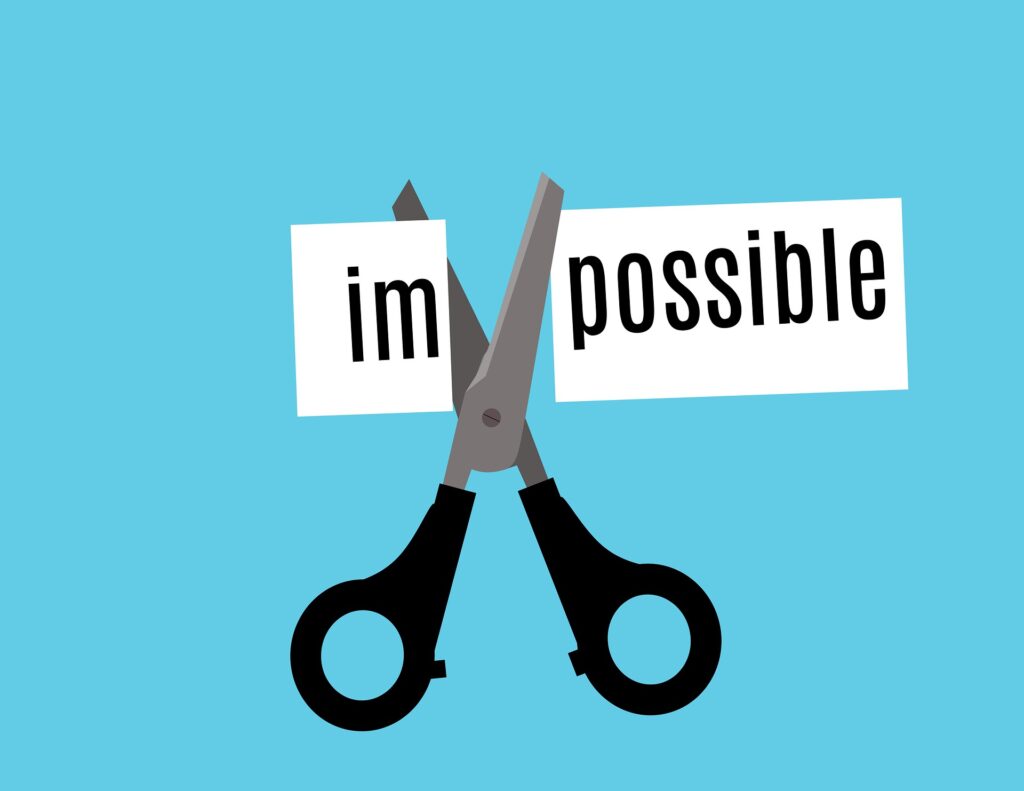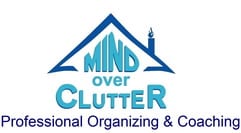5 words that stop you from getting organized
There are many words that give the impression of good intentions. Having good intentions is not enough to get you organized. Let’s look at some words that you can remove from your vocabulary when you are setting your organizing goals to make the impossible possible.

Soon
When you say you will do something soon you have not assigned a specific deadline to the activity. As time passes you keep saying, ” I’ll do it soon”. Overcome this form of procrastination by scheduling an appointment with yourself, date and time. Setting a specific deadline for a task is one form of motivation that helps some people complete a job.

Try
You may have heard the saying, “try and try again”. It implies if you keep doing something you will get better at it. That is true. However, when people say they will try to get organized, there is no commitment to the task. After having tried they can leave the task unfinished. They tried no one helped, they tried they didn’t know how to get organized, they tried and ran out of time, they tried and they were too tired to finish. Using the word try gives you an excuse to explain the reason you were not successful at getting organized. When you are making your organizing plan be more specific. Set a goal of what you will do.
Want
The word want doesn’t help to differentiate the reason for keeping things. People want lots of things for many reasons. It might be pretty, a gift, memorabilia, affordable or belonging to you. When you are looking at your stuff develop a set of questions to help you decide if you should keep something or let it go. These questions will be different for everyone. Some questions you can ask are:
- Do you use it?
- Does it bring you joy, do you like it?
- Is it a legal or financial document, an important document?
- If you give it away what is the worst thing that can happen?
- Is it best of the best of all the ……… you have? Best purse, best casserole, best hammer, best book
- If you need it could you borrow it from someone?
You most likely want almost everything. Using the word want as decision criteria to decide what to keep and what to let go is a way of putting off the decision.
Could, Would, Should
What are the could, would and should in your organizing life? I could have decluttered before moving. I would get organized if I had time. I should have started this task much earlier. Examine what you think you should have done and compare it to what you have done. Are you satisfied with the way your home is organized? Is the “should “picture of how to organize a home someone else’s goals that you think you “should” do? Maybe the “should” voice in your head came from a parent, friend or co-worker. Look at the difference in the reality of your organized home and the should voice and decide what is really the way you want it to be. Attempting to meet other people’s expectations when they are not the same as yours leads to anger, anxiety and stress preventing you from continuing on your own path to an organized home.

Maybe
This is a very polite word. You are not taking any sides. There is no commitment to do anything. Maybe I can organize the garage on Saturday. Maybe I’ll take that course you suggested to learn how to organize. Maybe we can set a date and you can help me to get organized. Instead of thinking about your organizing situation in terms of maybe doing something to change it, be more specific about what you want to do. Remove the maybe from your sentence. It will make it a more powerful declaration of your intention. I’ll take that course you suggested. I’ll work on organizing the garage on Saturday. I’ll set a date so we can work together. Be bold if you don’t want to do something. I like the way my garage is organized it works for me. Thank you for offering to help me get organized, I like doing it on my own schedule. Choose the path that is best for you and avoid the maybe path.
Comment on what words or phrases stopping you from getting organized.

Julie Stobbe is a Trained Professional Organizer and Lifestyle Organizing Coach who brings happiness to homes and organization to offices, in person and virtually. She has been working with clients since 2006 to provide customized organizing solutions to suit their individual needs and situations. She uses her love of physical activity to reduce clutter, in your home and office. She guides and supports you in managing your time. If you’re in a difficult transition Julie can coach you to break-free of emotional clutter constraining you from living life on your terms. Online courses are available to help instruct, coach and support your organizing projects. Get started by downloading Tips for Reorganizing 9 Rooms.
Contact her at julie@mindoverclutter.ca


These are really great – so true and a good exercise to think about what we are saying to ourselves
Changing the vocabulary you speak or think can make a big difference in how you determine your success in a project.
Perfection and overwhelm! I tend to be an all or nothing type sometimes, and if I don’t think I can get it all done and organized I don’t start. Definitely not the right course of action as a busy mom of 3 – something surely is better than nothing lol!! 🙂
Perfection is a good word to add to my list. Sometimes people get frustrated because they can’t get it “right” the first time. Organizing is a process and having a system that grows and changes with your needs is the best system. Overwhelm stops you from even thinking about the situation. Changing that word to challenge or challenging might motivate people to start.
What a great idea to look at the words we use that might keep us from getting organized!
In my home, the word is probably “others.” I’m willing to let go, but my my husband is less willing. After many years of marriage, we are moving toward each other. I have seen times when he was right to hold onto something I would have shed. I’d say, “At least, I’m trying,” but that was one of the words that can get me into trouble LOL!
It is easy to move the organizing situation to someone else and make it their problem. Others won’t ……… so you can’t get organized. It takes the responsibility away from the first person. Great word with so many meanings.
I love your list of unhelpful words that prevent us from moving forward and getting organized. ‘Someday’ is another one that can get in the way…as in “I might need it someday.”
If you’re really stuck moving forward, it helps to have an organizing buddy. It can be a non-judgmental friend, family member or professional organizer. But having some accountability and a fresh, neutral perspective can make all the difference.
Someday is another word that allows people to procrastinate. It is on their list to do when… there is nothing else to do….it rains…They’ve had enough sleep. It is said that someday never comes.
These are great! I will think about these with my own daily goals regarding diet and exercise as well. Great article, thank you!
These words that talk about intention help you to form a picture of what you might want to do. A picture is helpful to lead you in a direction. Use action words that help you to do the necessary work
Language is such a powerful thing – much more powerful than we give it credit for being. I love all of your examples. One of my personal words to avoid is ‘later’. It is similar to ‘soon’. I tell clients that ‘later is not a time’.
I love that phrase, later is not a time. As they say later never comes. Setting a specific schedule is so important to turn your intentions into goals and actions.
You picked five important ones. Any time a client says “soon” or “someday” I remind them that those aren’t days on the calendar, and there aren’t any slots in the tickler file for them, so we need to prioritize and find specific dates (for soon) or plan future space to review if it’s still a priority (in a future month’s tickler file slot)!
But my favorite of your picks is “should,” because more times that not, a “should” on the list is someone else’s priority that got turned into an obligation. If you should do it, but don’t want to do it, and it doesn’t involve feeding your children or paying your taxes, then it’s time to look at why you think it’ s a priority and why you aren’t doing anything to move yourself forward. Great points!
I like how you explained that a should is a priority on someone else’s list. Making sure all the should do’s are something that you want to do is important. Otherwise, your motivation to complete that task is very low. It helps to create stress with a number of low priority “shoulds” sitting in the back of your mind. Release them.